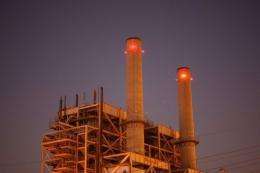A natural gas powered factory pictured in 2009 in Long Beach, California. US emissions of greenhouse gases blamed for climate change rose in 2010, ending a brief downward turn as the world's largest economy gradually recovers from recession, official data showed Monday.
US emissions of greenhouse gases blamed for climate change rose in 2010, ending a brief downward turn as the world's largest economy gradually recovers from recession, official data showed Monday.
In a submission to the UN climate organization, the United States said that its greenhouse gas emissions grew by 3.2 percent in 2010 compared with the previous year after two consecutive year-on-year falls.
The data also showed that the United States -- the world's second largest emitter of greenhouse gases after China -- would need to move aggressively if it seeks to reach President Barack Obama's targets for tackling climate change.
The Environmental Protection Agency said in the annual report that the rise in emissions was "primarily due to an increase in economic output resulting in an increase in energy consumption across all sectors."
In what could be considered a chicken-and-egg dilemma in holding back rising temperatures, the agency said Americans burned more coal and gas in 2010 partly because an unusually warm summer raised demand for air conditioning.
US greenhouse gas emissions hit 6.82 billion metric tons in 2010, up from 6.61 billion in 2009, it said. The total was still below the 7.25 billion recorded in 2007 before the onset of the global recession.
The United States emitted a net 5.75 billion metric tons of carbon dioxide and other greenhouse gases in 2010 when factoring in so-called sinks that balance off emissions, such as forests and carbon capture technology.
Obama took office pledging to take action on climate change, in a major shift from his predecessor George W. Bush who scorned the Kyoto Protocol as unfair by not demanding action of major developing countries.
But Obama has faced a political backlash, with a plan to restrict carbon emissions dying in the Senate in 2010. Numerous lawmakers of the rival Republican Party challenge the science behind climate change and say that government-led requirements would be too costly.
In the run-up to the fractious UN climate summit in Copenhagen in 2009, Obama pledged that the United States would cut emissions by 17 percent by 2020 from 2005 levels.
According to the latest data, emissions fell 5.3 percent from 2005 to 2010, showing that meeting Obama's goal is possible but would require significant effort.
But some environmentalists have criticized Obama's goal as deceptive as the European Union and Japan calculate targets from the base year of 1990. Compared with 1990, US emissions are up 10.5 percent, according to the latest data.
(c) 2012 AFP





















